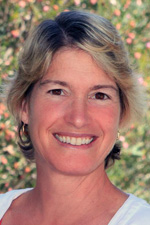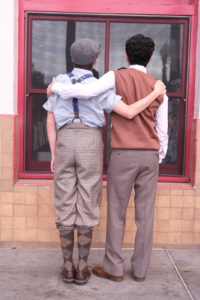
SAN DIEGO — If my interviews with these three spirited women is any indication of the energy of this show, Scripps Ranch Theatre’s Lost in Yonkers is going to blow your mind! Last Tuesday, I had the extreme pleasure of speaking with actor, Jill Drexler, director Jacquelyn Ritz, and dramaturg, Samantha Goldstein. In each conversation I heard respect and love for playwright Neil Simon, and a commitment to authentically telling this post-Holocaust story of the beauty and complexity of family dynamics.
No stranger to Neil Simon’s work, Ritz was Assistant Director for North Coast Rep’s performance of Laughter on the 23rd Floor. She had also acted in Simon’s Chapter Two. The director told me that she loves comedies and finds that post-pandemic she is especially drawn to lighter things. Comedy, Ritz explained, is a shared experience, whereas drama leaves people more introspective and less able/willing to talk about their reactions. This is not to say she doesn’t love great drama. This was evident in her acting in Lempicka, a recent play at La Jolla Playhouse. The emotional highs and lows required energy and connected her to humanity on a different level.
I wanted to know the greatest challenge of directing this show. Ritz told me that Simon provides a “beautiful roadmap” and when the actors follow it, audiences are able to connect, one to another. “The show invites us to explore ourselves, our space, our language, how we move with this character and interact with others.” To help the cast achieve this goal, Ritz conducts improvisation exercises with them. She finds their responses fascinating as they lean into their character’s personas.
Rittz also teaches acting classes for professionals. As an actor herself, she feels that she understands the challenge of incorporating all the different aspects of pulling off a successful production. For example, she encourages her actors to examine, “Why did my character move from here to there?” when there is something that feels inauthentic. Through this questioning method, actors begin to “realize the in-between moments” and understand their role more deeply. By helping the actor discover the cause and effect, they grow into themselves right before her eyes.

The director looks forward to directing more shows that break the glass ceiling. She wants to do more shows by women with more stories about women. Ritz is drawn to the theatricality but with a genuine twist. And ultimately she wants to send a message of resiliency. Ritz told me that Lost in Yonkers is a story about forgiving our parents and understanding our children, all the while loving each other.
Jill Drexler plays the role of Grandma Kurnitz, a German-Jewish matriarch who is tasked with raising her two grandsons, even while her own adult children require her support. She is a tough, realistic woman, not the mushy, indulgent Nana I knew. Drexler explains that Grandma is not a “monster, she’s had a tough life.” She wants her grandsons to survive and in her own experience, this comes from being tough and self-reliant. She is simply teaching them her philosophy because with the loss of his wife, their own father demonstrates weakness and surrender.
I asked Drexler her biggest challenge in this role, and she shared that it was in making Grandma a whole person, and not simply a caricature. The actor had to find places to “make her human” and did so in the moments of her teasing or revealing a sense of humor. Spoiler alert: she doesn’t soften at the play’s end.
Drexler, who identifies as half-Jewish expressed that she is very hurt by the Nazis’ actions. She struggled with the idea that people could be so inhumane. She is very proud of her performance in The Diary of Anne Frank and knew she had done her job well when the audience was left speechless at the play’s close. The show had hit its mark and the audience was literally dumbfounded. Similarly, Drexler feels audiences will be surprised by the depth they’ll experience with Lost in Yonkers. While Simon is certainly known for his comedy, this play has entrenched comical moments. It is “not all fun and games,” said Drexler. The actor hopes people will come to see the play because she wants them to remember what it’s like to sit in an audience and be transported by great theater.
Another incredible woman, Samantha Goldstein, serves as dramaturg for this play. Her background in Jewish American history qualifies her to be an expert resource and all the more because her dissertation at UCSD was entitled, “Don’t Mind Me, I’ll Just Sit in the Dark….” Goldstein’s pursuit of her passion for uniquely Jewish American humor may be inherited. Her dad worked as a waiter in the Catskills while going to medical school. Who knew that Borscht Belt humor is inherited on the JAH gene? Her job as dramaturg is to go through the play and find places to provide context for the actors and directors. These lines inform her, and the cast, about the undercurrents of a story. For example, if Grandma Kurnitz works at the candy store on Saturdays, the family is not shomer shabbos and has assimilated to working on Shabbat. In addition to working as a dramaturg, Goldstein lectures on Jewish humor and its history. She is available as a speaker for groups interested in learning about this unique aspect of our social history. (She may be contacted at shgoldst@ucsd.edu.)
Other cast members with whom I did not speak include Katee Drysdale as Bella, Kenny Bordiere as Eddie, Eddy Lukovic as Louie, Melanie Mino as Gert, J.P. Wischuk as Arty, and Giovanny Daiz de Leon as Jay. I was told by my three interviewees that the cast interacts as a genuine family with sibling rivalry and the attendant bickering and teasing.
I am really excited about seeing Lost in Yonkers after speaking with these dynamic women. I’m quite certain that with Neil Simon’s insightful, and likely autobiographical story, we will all find unique places to connect with each other and our history in ways that will benefit our future and reconnect us with our past.
Eva Trieger is a freelance writer specializing in the arts. She may be contacted via eva.trieger@sdjewishworld.com